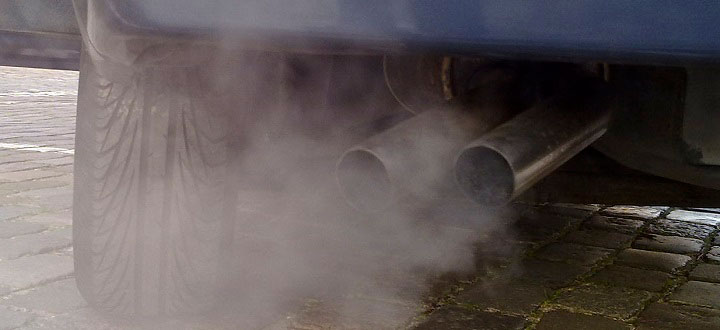Roadside tests uncover hidden diesel pollutant
Posted on 19 October 2015
Our atmospheric chemists have detected dangerously high levels of new ‘hidden’ emissions from diesel engines.

Hydrocarbon compounds... can lead to the formation of ozone and particles which can cause health problems”
Research led by Dr Jacqueline Hamilton from the Wolfson Atmospheric Chemistry Laboratories shows that in London roadside tests, levels of pollutants known as long-chain hydrocarbons are up to 70 times higher than expected.
Hydrocarbons play a key role in the formation of ozone and particulates, two of our most dangerous air pollutants. They are part of a mix of compounds present in exhaust fumes which are difficult to detect.
“Diesel contains a very complex mixture of hydrocarbon material, which usually overwhelms current instrumental methods. There have been lots of studies of liquid diesel fuel content but measuring these hydrocarbon compounds in the exhaust is quite difficult,” says Dr Hamilton. “In our work, we developed a new method to characterise this ‘missing’ fraction.”
Health impact
She says the results raise more questions about diesel cars and the potential health impact of their exhaust emissions. The current VW emissions scandal is focused on levels of nitrogen dioxide which is implicated in a range of health conditions.
“Hydrocarbon compounds don't pose a health risk on their own. But they can lead to the formation of ozone and particles which can cause health problems. The impact of these emissions is still unclear but further studies will be able to quantify their health effects.”
The study showed that up to 50 per cent of the ozone production potential in London in winter and 25 per cent in summer is due to diesel related hydrocarbons.
Smog
Ozone is a major element of ground level smog. It can cause cause inflammation in the lungs, coughing and chest pains.
Dr Hamilton is also working on the Com-Part research project with the Universities of Manchester and Birmingham looking at how levels of diesel emissions vary depending on engine and weather conditions.
The team are measuring how emissions react with sunlight to create secondary pollution. They also found that diesel engines are more polluting when they are first turned on and when they are accelerated aggressively - currently these conditions are not routinely measured as part of manufacturers’ tests.
Atmospheric chamber
The work is based on results from an engine tested in a specially made atmospheric chamber at the University of Manchester. It is funded by the Natural Environment Research Council (NERC)
Dr Hamilton says: “Any new on-road emission tests need to look at all the emissions, including hydrocarbons. It is clear that without looking at the whole emission profile, we could end up missing the opportunity to lead to significant improvements in urban air quality.”
The text of this article is licensed under a Creative Commons Licence. You're free to republish it, as long as you link back to this page and credit us.

Dr Jacqueline Hamilton
Research interests in atmospheric chemistry,analytical chemistry and aerosol science
Publications
Diesel-related hydrocarbons can dominate gas phase reactive carbon in megacities is published in Atmospheric Chemistry and Physics
Projects
Find out more about the Com-Part project measuring engines under ‘real world’ conditions Com-Part: Combustion Particles in the Atmosphere: Properties, Transformations, Fate & Impacts
The Com-Part project is funded by NERC, the Natural Environment Research Council
Visit the departments
Explore more research

A research project needed to spot trees on historic ordnance survey maps, so colleagues in computer science found a solution.

We’re using gaming technology to ensure prospective teachers are fully prepared for their careers.

A low cost, high-accuracy device, could play a large part in the NHS's 'virtual wards'.
